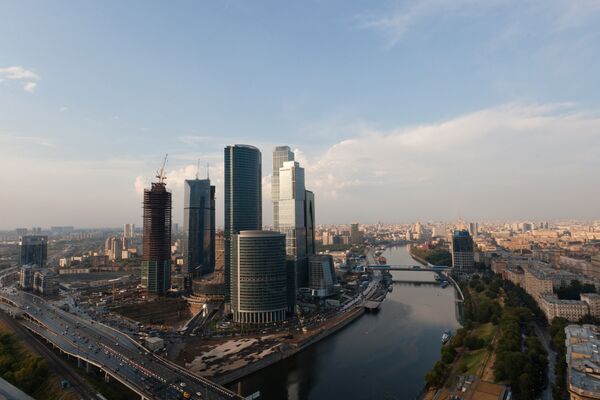Moscow should not be the only international financial center in Russia; large regional cities should play this role, too. This ambitious goal was declared by Sergei Naryshkin, chief of President Dmitry Medvedev's Executive Office, at the recent Baikal Economic Forum.
Two years ago, President Medvedev first set the goal of transforming Moscow into an international financial center. The idea was to make Moscow a financial hub with high concentration of banks and other financial institutions performing transactions with currency, credit, securities and gold.
However, for Moscow to claim the status of international financial center, Russia will first have to institute several major economic reforms. The ruble must become fully convertible if it’s to be widely used in international transactions. Odd Per Brekk, the IMF’s Senior Resident Representative in Russia, raised this issue at the international conference, “Moscow as an International Financial Center, the Russian Ruble as a Reserve Currency: Reality and Prospects.”
Furthermore, inflation must remain low and stable over a long period of time. A country with inflation in excess of 10% has no chance of seeing its capital become an international financial center. A healthy macroeconomic policy and political stability are also important prerequisites.
But economic reforms are not enough. Certain infrastructure problems must also be addressed. Moscow needs a more efficient transportation system, reliable access to new communications for all users, and more qualified, local financiers. Moscow must adapt at the most basic level. For example, we need more people employed in services that speak at least English.
London and New York are currently the two largest international financial centers, and they are in a different class than their nearest competitors – Zurich, Frankfurt and the financial centers of Asia. It will be extremely difficult for Moscow to meet the president’s challenge even in the medium term. Moscow currently ranks 68 on the list of the top 75 international financial centers. St. Petersburg ranks 70.
Although Russia is one of ten largest economies in terms of GDP, its banking and financial sector is modest. Moreover, in 2009 the number of branch offices of lending institutions fell by 5.8% due to the economic downturn, from 2,695 to 2,538. Sberbank, Russia’s biggest lender, closed 130 branches. There is one bank per 3,300 residents on average in Russia and one per 2,600 in Moscow, whereas in Europe there is one bank per 1,000 residents. Go to any old town 200 km outside of Moscow and you’ll realize that Moscow is still a long way from becoming an international financial center: stores do not accept credit and debit cards even in mid-sized towns, and the only ATM is located at the bank.
The volume of Russia’s financial market reached $860 billion in 2009. This is just 10% of the U.S. market, 20% of China’s, 40% of Japan’s, and 50% of the markets in Britain, France and Germany. It is comparable to the markets in South Korea and South Africa.
What’s more, Russia places far below global leaders in all key rankings released by global financial institutions. Investors rely on these rankings when choosing a market for their projects. Russia has been 63 of 139 on the World Economic Forum’s Global Competitiveness Report for several years running, right between Sri Lanka and Uruguay. Switzerland is number 1, followed by Sweden and Singapore – not the United States or Germany, as you might expect. China, India and Brazil rank 27, 51, and 58, respectively. Russia is ranked 125 of 139 in terms of the level of development of its financial market, 128 in protection of property rights, and 132 in protection of investor rights.
On the World Bank’s Ease of Doing Business Index, Russia ranks 120 of 183 countries, which means that investor rights are not well protected in Russia. This is the lowest ranking among countries with aspirations of becoming an international financial center.
Transforming Moscow into an international financial center will be a gradual process. Currently, Russia can only expect to become a regional financial center for the countries of the former Soviet Union.
“There is an idea to promote financial integration as part of the Common Economic Space,” said Anna Menshikova, a department head at the Economic Development Ministry. The former Soviet republics have a shared history with Russia, and knowledge of Russian is widespread. This, together with the fact that Russia’s economy is outperforming other economies of the former Soviet Union, should make it easier for Russia to sell its financial services in the countries of the CIS.
One of the first steps toward establishing a regional financial center and creating a common financial space could be for Russia to perform all of transactions with its CIS partners in rubles. An agreement on trading and investing in rubles has already been reached with Belarus, and several investment projects in Kazakhstan will be financed in rubles. This will help reduce currency risks.
Moscow has a more or less realistic shot at becoming an international – albeit regional – financial center, which is more than I can say for the government’s plan to turn other big Russian cities into financial centers. This idea is simply not supported by the numbers.
The views expressed in this article are the author’s and do not necessarily represent those of RIA Novosti.



